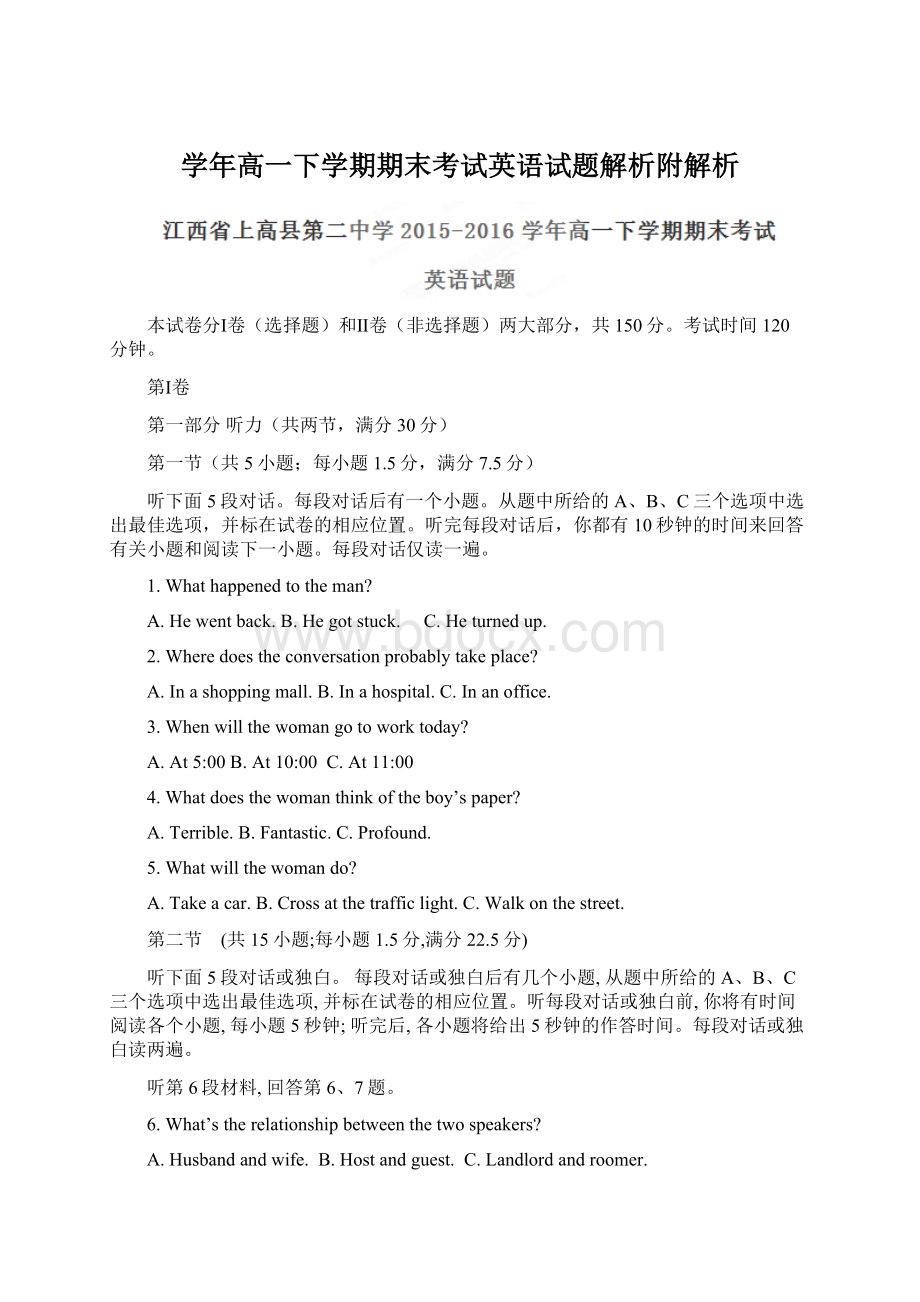学年高一下学期期末考试英语试题解析附解析.docx
《学年高一下学期期末考试英语试题解析附解析.docx》由会员分享,可在线阅读,更多相关《学年高一下学期期末考试英语试题解析附解析.docx(23页珍藏版)》请在冰豆网上搜索。

学年高一下学期期末考试英语试题解析附解析
本试卷分Ⅰ卷(选择题)和Ⅱ卷(非选择题)两大部分,共150分。
考试时间120分钟。
第Ⅰ卷
第一部分听力(共两节,满分30分)
第一节(共5小题;每小题1.5分,满分7.5分)
听下面5段对话。
每段对话后有一个小题。
从题中所给的A、B、C三个选项中选出最佳选项,并标在试卷的相应位置。
听完每段对话后,你都有10秒钟的时间来回答有关小题和阅读下一小题。
每段对话仅读一遍。
1.Whathappenedtotheman?
A.Hewentback.B.Hegotstuck. C.Heturnedup.
2.Wheredoestheconversationprobablytakeplace?
A.Inashoppingmall.B.Inahospital.C.Inanoffice.
3.Whenwillthewomangotoworktoday?
A.At5:
00B.At10:
00C.At11:
00
4.Whatdoesthewomanthinkoftheboy’spaper?
A.Terrible.B.Fantastic.C.Profound.
5.Whatwillthewomando?
A.Takeacar.B.Crossatthetrafficlight.C.Walkonthestreet.
第二节 (共15小题;每小题1.5分,满分22.5分)
听下面5段对话或独白。
每段对话或独白后有几个小题,从题中所给的A、B、C三个选项中选出最佳选项,并标在试卷的相应位置。
听每段对话或独白前,你将有时间阅读各个小题,每小题5秒钟;听完后,各小题将给出5秒钟的作答时间。
每段对话或独白读两遍。
听第6段材料,回答第6、7题。
6.What’stherelationshipbetweenthetwospeakers?
A.Husbandandwife.B.Hostandguest.C.Landlordandroomer.
7.Howmanyelectricalappliancesarementionedintheconversation?
A.3.B.4.C.2
听第7段材料,回答第8、9题。
8.WhereistheclosestATM?
A.Nexttotheyellowbuilding.B.Onthe3rdstreet.C.Onthe22ndstreet.
9.Howwillthewomanprobablygettothedestination?
A.Bysubway.B.Bytaxi.C.Onfoot.
听第8段材料,回答第10至12题。
10.Wherewillthewomanleavefor?
A.NewYork.B.Beijing.C.Theairport.
11.WhatworriesthemanaboutgoingtoBeijing?
A.ThetriptoBeijingmaybenotwonderful.B.Hisnationalcurrencyisdevalued.C.TheconsumptioninBeijingisquitehigh.
12.Whatdoesthewomanaskthemantodo?
A.Ignoretheexchangerate.B.ConsidervisitingBeijing.
C.ImmigratetoBeijing.
听第9段材料,回答第13至16题。
13.Wheredotheyhavemeal?
A.Inthecanteen.B.Intherestaurant.C.Atthetake-outshop.
14.Howmanykindsofstaplefoodareonthemenu?
A.10.B.7.C.4.
15.Whichofthefollowingdon’ttheyeat?
A.Stewedcabbagewithbeef.B.Friedfish.C.Sweetandsourfish.
16.Whatcanweknowabouttheman?
A.Heisfromnorth.
B.Beefisoneofhisfavoritefood.
C.Heatethreehelpingsofsteamedbread.
听第10段材料,回答第17至20题。
17.Howdoesalonelypersonfeelaccordingtothepassage?
A.Common.B.Isolated.C.Quiet.
18.Howlongdoesthesecondlonelinessusuallylast?
A.Formorethanayear.B.Forlessthanayear.
C.Formorethantwoyears.
19.Whichkindoflonelinessisthemostserious?
A.Thefirstkind.B.Thesecondkind.C.Thethirdkind.
20.WhichhobbytoreduceyourfeelingsoflonelinessisNOTmentioned?
A.Joiningcraftclasses.B.Attendinglectures.C.Spendingqualitytimewithothers.
第二部分阅读理解(共两节,满分40分)
第一节(共15小题;每小题2分,满分30分)
阅读下列短文,从每题所给的四个选项(A、B、C、和D)中,选出最佳选项,并在答题卡上将该项涂黑。
A
EnglishConversation
Leader:
MandiAshmore
english@iwc-lausanne.org
WemeetonMondaysat14:
30attheIWCclubhouse.Wechatforaboutanhouranddiscusseverything.Mandiasks“students”tocontactheronMondaytoconfirmtheclassassometimessheneedstocancelforvariousreasonsoroccasionallyshemaychoosetoholdtheclassatadifferentvenue(举办地点)oratanearliertimeforustobeabletohavelunchtogether.
FrenchConversation,AdvancedBeginner
Leader:
MarielleSulmoni
frenchconvo@iwc-lausanne.org
I'mFrench(borninBordeaux)andSwissbymarriage.Iholdanadvancedbeginners'FrenchconversationclassonTuesdayafternoonsfrom14:
3016:
00.Wemeetweeklyattheclubhouseinafriendlyatmosphere.IhopetohelpyouuseyourknowledgeofFrench,allowingyoutospeakwithnofearofmakingmistakes,whichintimewillbecomefewerandfewer.
FrenchLanguageLab,Beginner
Leader:
MaijaRemlinger
frenchlab@iwc-lausanne.org
ThegroupmeetsonThursdayafternoonsfrom15:
00-16:
30attheclubhouse.Thefirsthalfoftheclassisdevotedtoreadingoutloudfromthebook“EasyFrenchReader”,workingonpronunciationandphrasing.Duringthesecondhalf,welistentoaudiorecordingsfrom“NewFrenchwithEase”andworkonoralcomprehension.
FrenchConversation,Advanced
Leader:
JulietteBrull
french@iwc-lausanne,org
WemeeteveryTuesdayattheIWCclubhousefrom9:
30-11:
00.Mostofourtimeisdevotedtoverylivelydiscussionsaboutcurrenteventsandvarioustopics.WealsoreadabookwrittenbyaFrenchauthorandsometimesweseeaFrenchmovie.
21.WhyareyouadvisedtocontactMandi?
A.Tocheckthearrangement.B.Toexchangeideas.
C.Todecidethetopics.D.Toaskforleave.
22.Whichoftheclubsfocusesmainlyonthebasicknowledgeoflanguage?
A.EnglishConversation.B.FrenchConversation,Advanced.
C.FrenchLanguageLab,Beginner.D.FrenchConversation,AdvancedBeginner.
23.WhowillyougetintouchwithifyoulikewatchingFrenchfilms?
A.MandyAshmoreB.MarielleSulmoniC.MaijaRemlingerD.JulietteBrull
【答案】
21.A
22.C
23.D
22.C细节理解题。
根据FrenchLanguageLab,Beginner中Thefirsthalfoftheclassisdevotedtoreadingoutloudfromthebook“EasyFrenchReader”,workingonpronunciationandphrasing.可知要大声读课文,着重于发音和词组。
可知C项符合题意。
23.D细节理解题。
根据FrenchConversation,Advanced中sometimesweseeaFrenchmovie.有时候看法国电影。
可知D项符合题意。
考点:
考查教育类阅读
B
Foralongtime,thetraditionalmethodofidentifyingliarswastowatchtheirbodylanguage,includingfacialexpressions
Whatifthepersonappearstobenervous?
Isthepersonunabletolookmeintheeye?
Isheorshelookaroundtheroom?
Whataboutothernervousmovements,suchasfidgeting(坐立不安)orshiftingfromsidetoside?
Manypeople—fromparentstopoliceofficersandairportsecuritypersonnel—dependonthismethod.Butdoesaperson’sbodyandfacerevealthetruth?
Notaccordingtoanewstudy.
Talking,itseems,isthebestwaytosmokeoutaliar.ThatiswhatresearchersintheUnitedKingdomfoundoutrecently.Theirinvestigationtookplaceatoneplacewherelyingcangetyouintobigtrouble—anairport.
Theresearchersaskedvolunteerstopretendtheywererealpassengersandthenlietoairportsecurityagents.Someoftheagentsusedspokeconversation-basedmethodstoquestionthesemake-believepassengers.Othersdependedinsteadontheperson’sbodylanguage,likelackofeyecontactandshowingsignsofnervousness.Theagentstalkingwiththepassengerswere20timesmorelikelytocatchtheliars.Thestudyfoundthattheseconversation-basedtechniquescanhelpyourecognizewhenapersonislyingtoyou.Likemanymethods,thisconversationmethodhasaname.ItiscalledControlledCognitiveEngagementorCCE,forshort.
TheBritishgovernmentpartlyfinancedthisstudy.TheAmericanPsychological(APA)publishedthefindings.Bodylanguagecannotbetrusted.Usingbodylanguageandfacialexpressionstocatchsomeoneinalieisreallyhard.Anditonlyworks,seemingly,bychance.
ThomasOrmerodistheheadoftheSchoolofPsychologyattheUniversityofSussexinEngland.OntheAPAwebsite,hereportedthatthe“suspicious-signsmethod”—orusingbodylanguage—“almostcompletelyfails”infindinglies.
24.WhatarethequestionsinParagraph2intendedtodo?
A.Showtraditionalwaystorecognizealiar.B.Launchasurveyamongreaders.
C.Showthewriter’spuzzlement.D.Invitethereaderstothinktwice.
25.Whatshouldvolunteersintheinvestigationdo?
A.Answerquestionsonlyusingwords.B.Pretendtobeairportsecurityagents.
C.Actaspassengersasresearchersrequired.D.Communicatewithresearchersbytalking.
26.Whichwouldbethebestwaytofindoutaliaraccordingtothestudy?
A.Lookinghimintheeye.
B.Askingopen-endedquestions.
C.Makinguseofbodylanguage.
D.Observinghisfacialexpression.
27.Whatwilltheauthorcontinuetotalkaboutbasedonthepassage?
A.Misunderstandingsofcatchingaliar.B.The“suspicious-signs”method.
C.HowtheCCEmethodworks.D.ThenewconceptofCCE.
【答案】
24.A
25.C
26.B
27.B
25.C细节理解题。
根据第四段第一句Theresearchersaskedvolunteerstopretendtheywererealpassengersand
thenlietoairportsecurityagents.研究人员要求志愿者假装自己是真的乘客,向机场工作人员撒谎。
可知C
项符合题意。
【名师点睛】
事实询问题,这类试题通常以疑问词what/who/when/where/why/how引起的特殊问句,就文章中某一词语、某一句子、某一段落或某一具体细节和事实进行提问。
解答此类试题首先要弄清题目和每一个选项的含义,然后按题目要求寻找与之相关的细节,正确估计答案来源。
同时要注意题目和文章中的暗示作用,特别注意辨别各种信息,确认各种信息。
比如第26小题,B细节理解题。
根据第四段最后三句Thestudyfoundthattheseconversation-basedtechniquescanhelpyourecognizewhenapersonislyingtoyou.Likemanymethods,thisconversationmethodhasaname.ItiscalledControlledCognitiveEngagementorCCE,forshort.研究表明,谈话技能有利于识别谎言。
和其他方法一样,这些对话交流也有专业名词,叫做控制认知参与,或者CCE。
可知B项符合题意。
考点:
考查社会现象类阅读
C
Livingnearthebeachmaycomewithanextraperk(利益):
betterhealth.Anewstudyanalyzedinformationfrommorethan48millionpeopleinEnglandandfoundthatthenearertheylivedtothecoast,themorelikelypeopleweretoreportgoodhealthwithinthepastyear.
Livingnearthecoastmaybeassociatedwithbetterhealthbecausetheseasideenvironmentreducesstress,theresearcherssaid.TheypointedtoanotherBritishstudythatfoundthatpeoplewhotooktripstothecoastexperiencedmorefeelingsofcalmnessandrelaxationthanthosewhovisitedurbanparksorthecountryside.
Thedifferencefromlivingnearthecoastwasrelativelysmall.Butasmalleffect,whenappliedtoanentirepopulationcanhaveasubstantialimpactonpublichealth,saidstudyresearcherBenWheelerofPeninsulaCollegeofMedicineandDentistryinExeter,England.
However,it’stoosoontoadvisepeopletohitthebeachtoimprovehealth,Wheelersaid.Thestudyonlyfoundanassociation,notacause-effectlink,andit’spossiblethatotherfactorscouldexplaintheresults.Forinstance,itcouldbethatpeoplewhoarewealthier,andthereforehealthier,aremoreabletomovetodesiredlocationssuchasthecoast,Wheelersaid,aphenomenonknownasthemigranteffect.Butthe